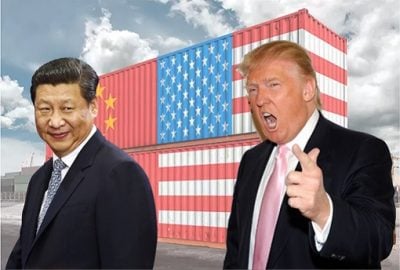Is US/China Trade War Looming?

VISIT MY NEW WEB SITE:
Contact at [email protected].
Trade wars assure losers, not winners.
So far, Trump announced tariffs on imported solar panels and modules, washing machines and parts, steel and aluminum fall far short of waging one.
At the same time, his rage to reduce America’s trade deficit with China could launch a bilateral one hurting both countries.
Countless numbers of US corporations moving production and other facilities to China caused the growing trade gap between both countries.
Companies seek a comparative advantage by producing goods or services where production and other costs are cheaper – a lower opportunity cost of doing business.
The Trump administration would be delighted if foreign companies produced more from US plants than elsewhere.
China is attractive for foreign companies to invest in, cheap labor a key incentive.
While America prioritizes militarism and warmaking, China focuses heavily economic growth domestically and through foreign markets, taking advantage of its increasing technological expertise in numerous industrial, high-tech and other sectors.
The nation is an economic powerhouse already matching America on a purchase price basis – heading toward becoming the world’s dominant economic power.
On Sunday, China’s Minister of Commerce Zhong Shan stressed the importance of resolving bilateral trade disputes cooperatively to benefit both countries, adding trade war will harm them and the global economy.
Trump’s announced tariffs target China more than other nations. Foreign Minister Wang Yi promised a “justified and necessary response.”
Prior to his announced steel and aluminum tariffs, Trump tweeted:
“China has been asked to develop a plan for the year of a One Billion Dollar reduction in their massive Trade Deficit with the United States.”
“Our relationship with China has been a very good one, and we look forward to seeing what ideas they come back with. We must act soon!”
Separately, he tweeted:
“The US is acting swiftly on Intellectual Property theft. We cannot allow this to happen as it has for many years” – aiming his remark at China without naming it.
Beijing doesn’t decide which US and other foreign companies move production and other facilities to China. It’s a private enterprise decision.
Companies operating from its territory can export goods and services wherever markets can be developed.
According to China’s Global Times, the country “must retaliate against US tariffs that forcibly interfere with Sino-US trade and violate World Trade Organization rules. China must show it won’t be bullied,” adding:
“Beijing must never consider stabilizing relations with Washington by compromising on trade.”
“We would only become increasingly passive. China and the US must resolve the issue through cooperation and both sides should try.”
“If the US cannot adjust its own industrial structure to reduce its trade deficit and orders the world to follow its words, China and the rest of the world will have no choice but to meet the challenge head-on.”
Canada and Mexico will be exempt from Trump’s steel and aluminum tariffs if NAFTA differences between them and Washington are successfully resolved in ongoing talks.
Treasury Secretary Mnuchin said NATO countries will be exempt if their military spending increases to levels Washington demands – a way to boost sales for US arms makers, unrelated to any global threats.
Countries bending to Washington’s will may be exempt from steel and aluminum tariffs, including China.
According to Mnuchin, Trump will consider national security in deciding which countries are excluded from tariffs.
Imposing them is more for political than economic reasons. As of now, it’s unclear how this will shake out.
*
Stephen Lendman is a Research Associate of the CRG, Correspondent of Global Research based in Chicago.
VISIT MY NEW WEB SITE: stephenlendman.org (Home – Stephen Lendman). Contact at [email protected].
My newest book as editor and contributor is titled “Flashpoint in Ukraine: How the US Drive for Hegemony Risks WW III.”

